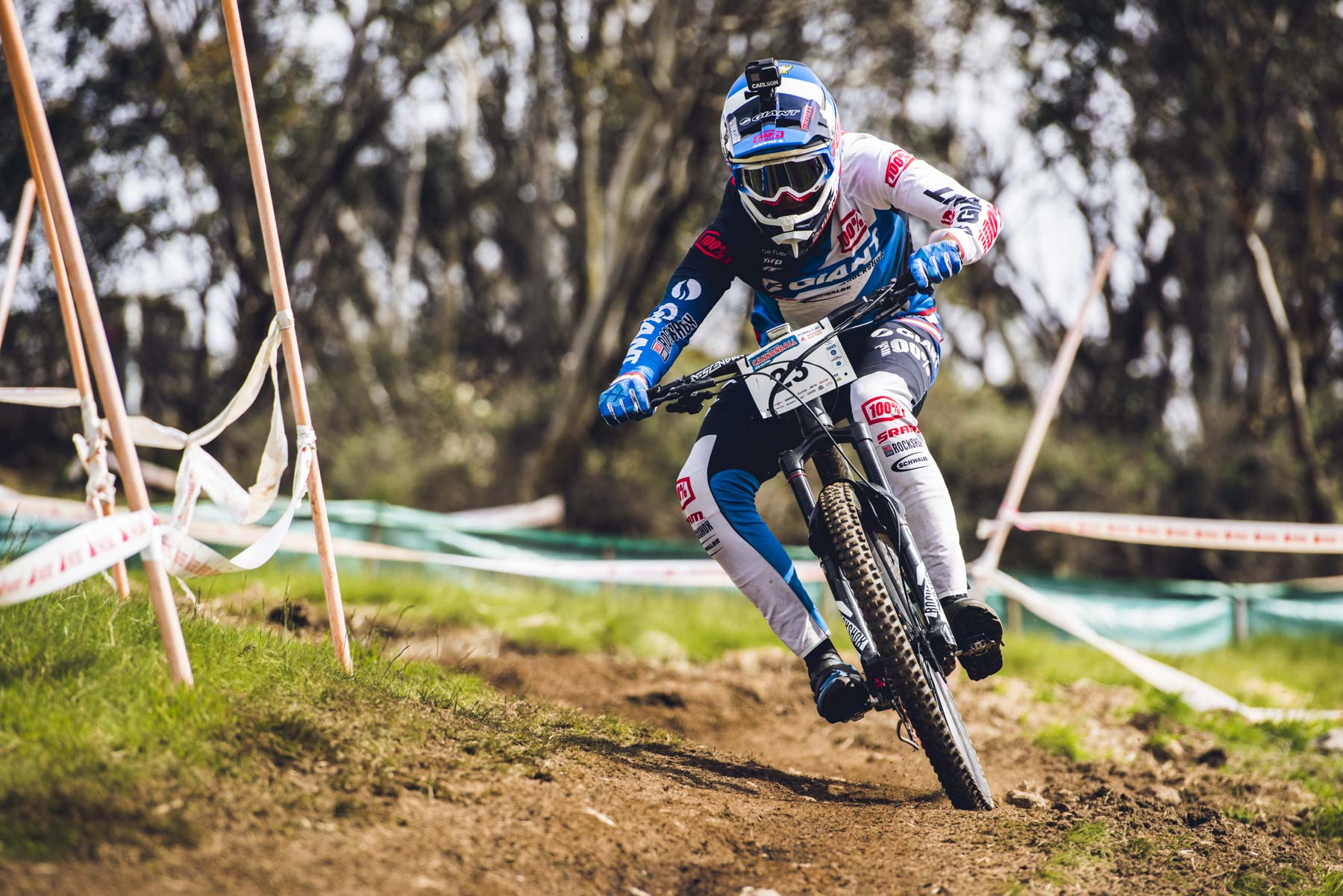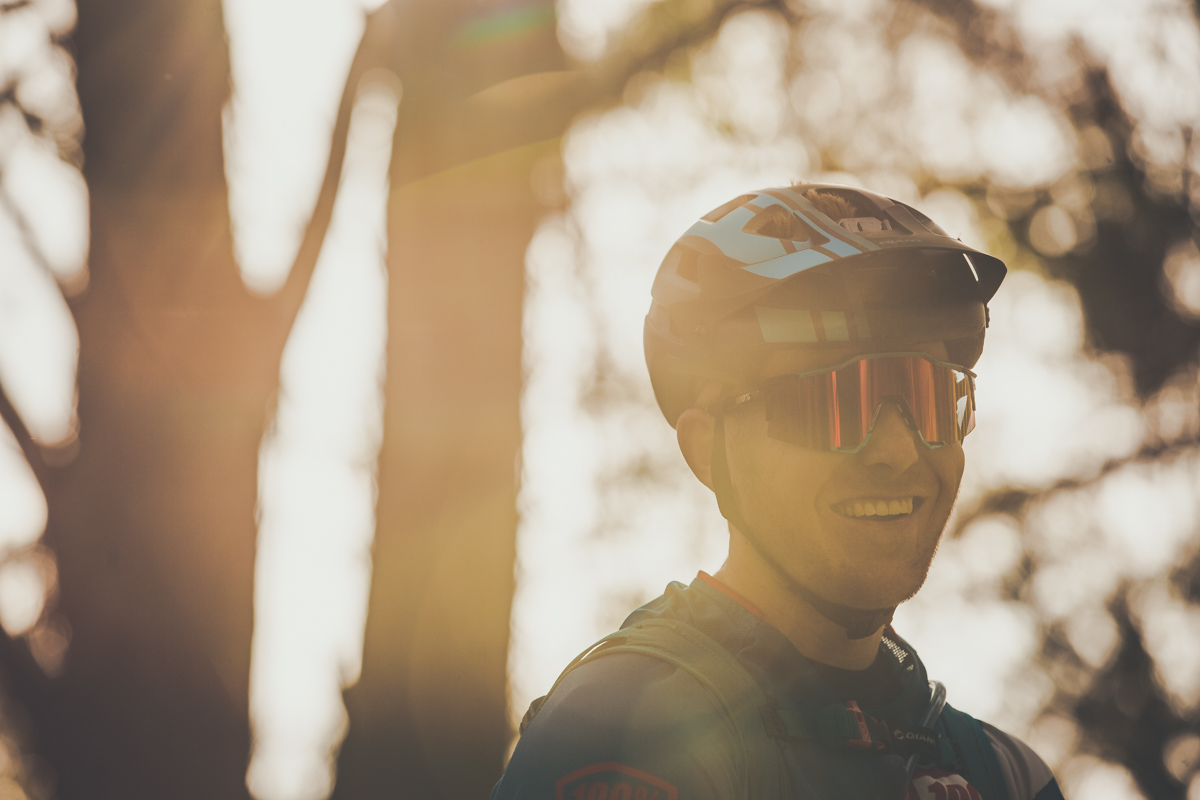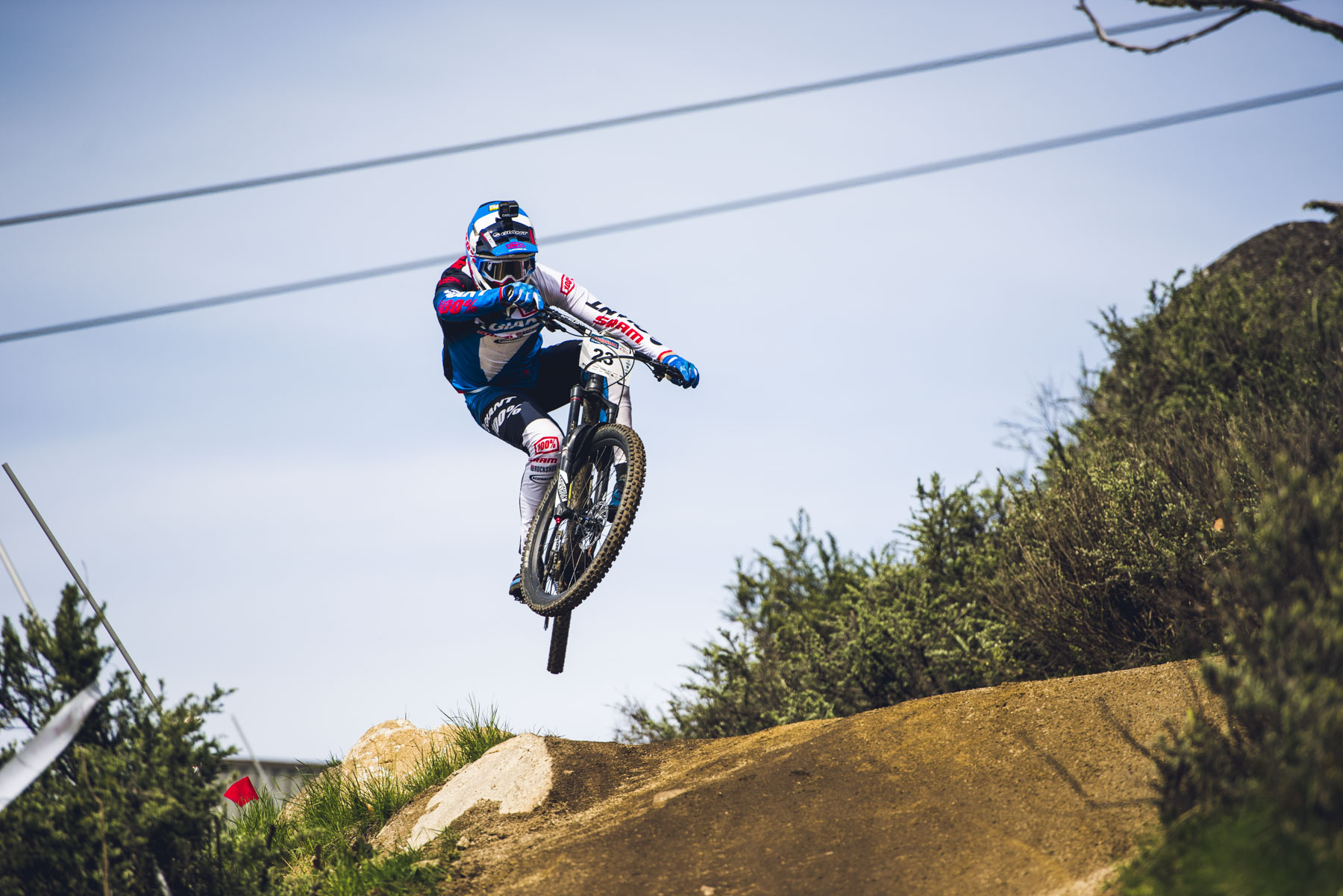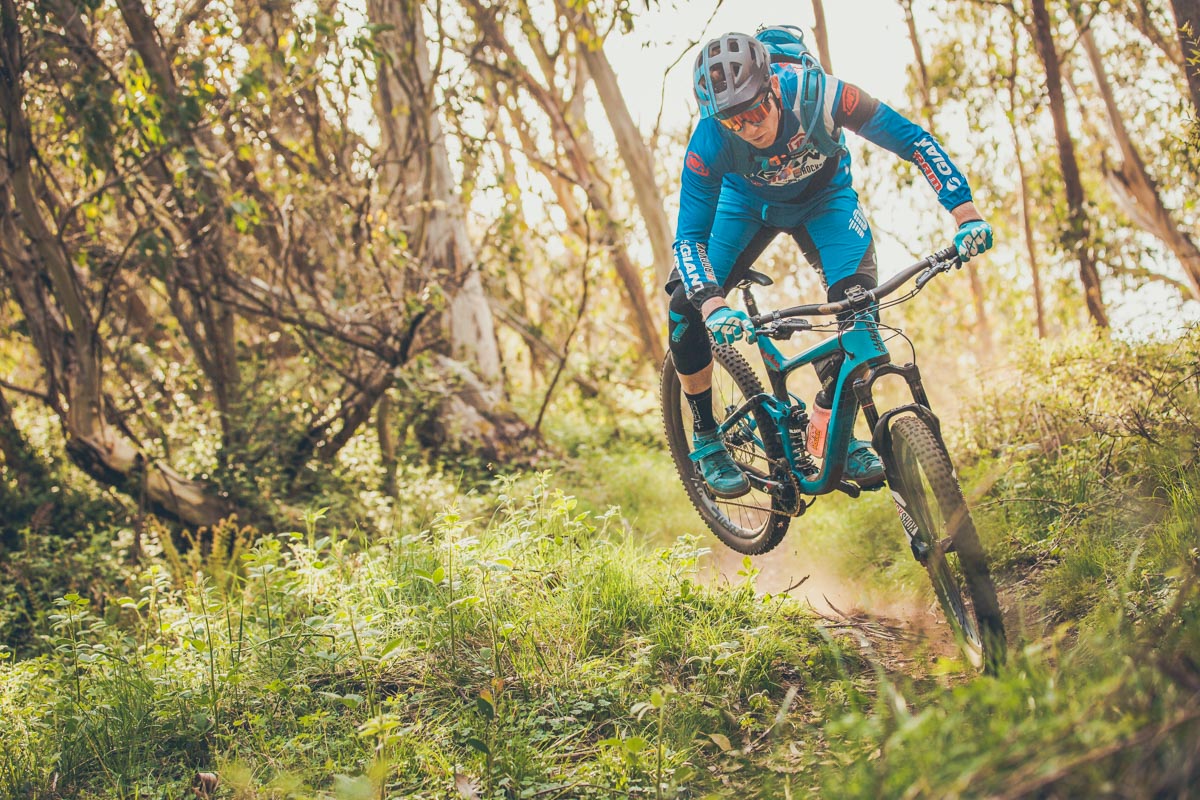In this interview, I talked with Josh Carlson about his psychological strategies as one of the world’s best EWS riders. After a brilliant 2016 experience, Josh had a disappointing 2017 season – so I was really keen to learn what he’s been doing to overcome these challenges as the 2018 season approaches.

Does fast happen in the legs or the head – which is more important in racing?
Josh Carlson (JC): It’s a bit of both really. The legs have to be there – EWS racing is hard, and you have to be able to rely on your body (so training is really important), but in the top 20 pretty much everyone has the same skills and fitness, so those top 20 places are decided by who has their head in the game that day.
EWS is very different form DH-racing. Downhillers can have a very specific physical and mental warmup routine. They already know the track intimately, they know what’s coming. They can time their meals perfectly, make sure that the caffeine hit kicks in at exactly the right time, listen to their perfect playlist while they spin on a warmup bike, and then they perform for three to five minutes. EWS riders are out for seven hours, in all conditions, and we have to concentrate on tracks not that different from DH courses, which we might have only ridden once or twice before if we’re lucky, when we’re tired, hungry, and cold, over and over again.

No one can concentrate for seven-hours flat, but being able to bring yourself back into the here and now when you need to is everything.
To be able to focus when it matters is the real key. No one can concentrate for seven-hours flat, but being able to bring yourself back into the here and now when you need to is everything. I can’t afford to be picky about how I get my head in the game. For example, in Ireland this year, I was getting ready when a local kid asked me for an autograph – he was so excited, was telling me his stories, and a big part of what I do for my team is be an ambassador, so I can’t just say “piss of kid”, I had to give him my attention, and then I had to bring my attention back to the ride ahead of me. What I’m saying is, because I have no control over what’s going to happen, I’ve had to learn how to choose when and where to focus, and when to be distracted.
Tell us about the toughest mental challenge you’ve faced in your career, and how you overcame it.
JC: It was actually this last season. It was really hard, and I wasn’t properly prepared, physically or mentally. The most frustrating thing was that once the season starts you can only maintain, there’s no room for development – that’s all got to happen in training off-season. So, all I could do was to try to hang on, and not make things worse.
The most frustrating thing was that once the season starts you can only maintain, there’s no room for development – that’s all got to happen in training off-season.
Probably the hardest challenge this year was in France at Millau – the weather was pretty crap, and there were a whole load of marshalling and timing errors. The marshals didn’t speak English, so I’m at the top of a stage and it’s raining, and I’m under a shelter and trying to get ready, and the guy translating for me tells me I’ve got three minutes, so I start to get my jacket off and my goggles out of their case. Then, like a minute later, the timing marshal says “20 seconds” and I can’t argue, so I had to shove my goggles on and take-off. It was wet and slippery and technical, and it needed all of my attention – there was no room to be pissed off about what had just happened.

Do you have a routine, either practically or mentally, pre-race and what importance does this have for your preparation?
JC: Like I said earlier, I can’t really do a specific routine. But being consistent is important. I need to do the same things during my season, trusting in my training, my technical ability, and my team. Going over to Giant was a big deal – all of a sudden there were all these people whose job was to help me go faster. I had to get used to that and to learn to delegate stuff to other people.
My mechanic has been amazing for this. He is as committed to doing his job well as I am to mine. Back in Chile, I think in 2015, he’d dialled the bike pre-race, and then noticed that a bearing was damaged. So, he stripped the whole bike and rebuilt it to be perfect – he stayed up until 2.30 in the morning to get it right. I trust him to do his part really well (which he does), so I can relax and get on with riding my bike fast, not having to worry about the other stuff.

On the other hand, I’ve had to learn to be a bit more selfish. I’m usually a pretty chatty guy and nearly all of the EWS riders get on really well – it’s like going for a ride with your mates. Except that it isn’t really, because it’s also my job. So, I have to be a bit less chatty, to give a bit less away to other riders, because I have to be focused on what I need to do. That’s been a challenge.
Do you have to deal with fear? How do you handle it?
JC: Fear isn’t really a problem for me. I mean, I’m frightened of not performing, and of letting down my team, but not of the riding itself. The EWS tracks are hard, and you really need the skills properly dialled down, from lots of practice and training, to be able to compete effectively, so I can’t be second guessing features on the trail – I just have to trust in my training.
You’ve also got to remember that I’m paid to take risks. If you’re not OK with those risks, you really don’t have any place doing what we do.

Is confidence more important than form?
JC: Neither. Form is a given in what we do – you get it from lots of practice, and you have to trust it. That’s competence, and it’s more important than confidence. Confidence is unreliable, but competence comes from proper preparation. Also, confidence is variable – you certainly can’t rely on it when you’re wet and cold and exhausted. That’s where the repetition and practice comes in. It’s all about being able to come back when you need to, and to focus on the job at hand without getting distracted by all of the other crap.
I’ve been working heavily with Lululemon to dial in some good meditation techniques that help me to regain focus. I’ve also worked with a sport psychologist this year on how to be present and focused under pressure. In my opinion, being able to perform consistently under pressure is everything and, thanks to the work I’ve been doing and the help I’ve been getting, my ability to choose when to focus is getting easier.

Is mental training part of your regime? If so, what do you do?
JC: As I mentioned, mental training has become a huge part of my approach. Physical fitness, endurance, and skills are essential, but in EWS the difference between 5th and 20th is focus. So, again, it’s all down to choosing when to focus; balancing everything so that you’re able to do what you need to do when you need to do it. Chat on way up, or play with your phone and Instagram at the top. But then it’s goggles on and leave it behind.

How do you handle situations when it all hits the fan? Do you prepare for this?
JC: The day we brought our daughter home from hospital she started choking, and going blue. I had to stay focused and calm while I worked on getting her to breathe. I amazed myself being able to focus on the (very important) job at hand, even though it was unbelievably scary. In comparison to that, anything that happens during a race is pretty small! I learnt that even with extreme emotional pressure, it is possible to choose to focus on what’s important, and to function effectively. But to do that, you can’t struggle with the emotions, you just have to accept what’s going on and redirect your attention to what matters then and there.

The other thing I’ve learnt over the last few years is to take time coming back from injury. Obviously, if you injure during the season, you just have to hang on and try not to make it worse (because you don’t really have a chance to recover properly) – but as soon as you get the chance, applying yourself to recovery at a slow pace is important. That way you get to rebuild properly physically, but also reintroduce yourself mentally to challenge, so that you don’t just freak out and damage your competence base.
If I was going to summarise what’s important, I’d say that it’s is about being able to notice the distractions and then come back to the moment despite those distractions – because they’re not going away, so the only thing you get to actually control is your actions.
Jeremy’s Observations
Josh has a very different take on his approach compared with the other riders I’ve interviewed. For starters, Josh has worked extensively with a sport psychologist, and between them, they’ve nailed down what it’s important for him to focus on, and have come up with good ways to make this work. Although the others I’ve talked with have great mental strategies, they’ve also had to spend a long time figuring these out by themselves, and then improving them through trial and error. Instead, Josh identified a deficit in his ability, and sought out ways to fix that deficit as quickly and efficiently as possible.
Josh’s strategies can be summarised in three main themes:
1) Adaptability and flexibility. Josh has been specifically working on improving his overall adaptability: recognising that things outside of his control will change (like the weather, or marshalling errors), so rather than trying to keep things the same and controllable, he’s learning to work with variability in environments where there are only a small number of things that he can control. The easier and faster it is for him to adapt, the better his chances of performing well.
Read more about being flexible on the trails here: https://flowmountainbike.com/features/how-expecting-to-fail-can-improve-your-performance/
2) Being comfortable with being uncomfortable. Josh has realised that to succeed in the EWS, he has to accept that it’s going to be really uncomfortable. If you watched any of the 2017 EWS season, you’ll know what I mean: wet, cold, long, and muddy were the norm for nearly all of the races, and if you’re not prepared to accept that sort of discomfort, you’re wasting precious resources. Josh has been working hard to improve his ability to process discomfort as information – and to be better at functioning in the presence of that information – no matter how unpleasant it might be. He knows that, compared to real challenges, like dealing with a life or death moment with his daughter, pretty much anything he experiences on the trails is both smaller and temporary.
I’ve written a bit about pain before here: https://flowmountainbike.com/features/the-soap-box-about-pain-using-pain-to-be-a-better-mountain-biker/
3) Choosing to focus, focus, focus. An important addition to Josh’s work on being more adaptable, is his ability to choose when to focus. I keep using the word “choose” for a reason: focus is a conscious action and, by definition, requires conscious choice. Josh is learning to be much better at choosing to focus on what matters to him, in the presence of everything else. He doesn’t block things out or force himself to ignore distractions, he notices them, accepts them, and then focuses his attention on what he needs to. The faster he can do this the better; bringing himself back as rapidly as possible when he’s been distracted can be the difference between a good race and a disaster.
In my opinion, the areas Josh has been working on are extremely important – so important, in fact, that I’ll dedicate a Flow article (in the near future) on how to cultivate and improve adaptability, comfort with discomfort, and focus under pressure. In the meantime, read here for some info on focus and attention: https://flowmountainbike.com/features/the-soapbox-riding-in-the-here-and-now/
About the author:
Dr. Jeremy Adams has a PhD in sport psychology, is a registered psychologist, and director of Eclectic Consulting Ltd. He divides his time between mountain biking, working with athletes and other performers, executive coaching, and private practice.
In past lives, Jeremy has been a principal lecturer in sport and performance psychology at a university in London, a senior manager in a large consulting firm in Melbourne, a personal trainer in Paris, and a scuba instructor in Byron Bay. He’s also the author of a textbook on performance in organisational management, a large range of professional and popular articles, and a regular blog about the joys and perils of being human (www.eclectic-moose.com).
Jeremy lives and works in Hobart and can be contacted through his website (www.eclectic-consult.com) or on (03) 9016 0306.
